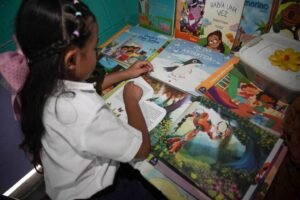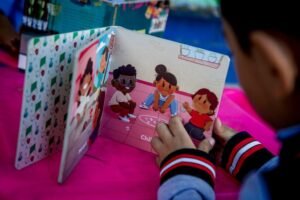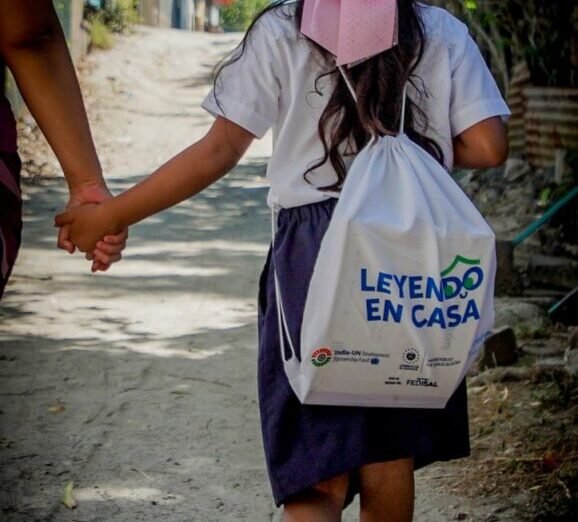 For the past two years, the Government of El Salvador has been implementing an initiative focused on encouraging and promoting the habit of reading starting in kinder garten and the first levels of basic education, as part of efforts to raise the levels of teaching and learning in the country.
For the past two years, the Government of El Salvador has been implementing an initiative focused on encouraging and promoting the habit of reading starting in kinder garten and the first levels of basic education, as part of efforts to raise the levels of teaching and learning in the country.
This is the “Reading at Home” project, a strategy led by the Ministry of Education and Technology as part of the National Reading Plan, which aims to strengthen text comprehension and reading fluency, key aspects for students’ academic training.
The implementation of the first phase of this project – which was recently successfully completed – was supported by the United Nations Children’s Fund (UNICEF) and a financial contribution of US$1 million from the India-UN Development Partnership Fund, managed through the Ministry of Foreign Affairs.
Thanks to this accompaniment, 18,000 books and support materials in different formats were distributed in 84 schools in 74 districts throughout the country, benefiting around 6,000 children in the public education system, who not only have access to these materials in their schools, but can also take the publications with them to continue reading at home, making parents a key part of this process.
“It has been a real privilege to have this innovative project, especially because we are in a rural area. So, it has been beneficial for both children and families to implement reading from an early age to encourage imagination, creativity and critical thinking,” says Dacia Reyes, a teacher at the Centro Escolar” Cantón San José Shangallo” in the district of Ilopango, one of the schools that have successfully implemented this teaching-learning modality.
The teacher points out that, in addition to books, educators also have exchanges with experts in reading, who encourage them to create different strategies to promote this practice inside and outside the classroom, including during breaks and at home. They have also received visits from Salvadoran writers, which have served to further motivate this experience.
“We do dynamics such as the travelling book, we create theatrical plays, puppets and other activities in which the child is the protagonist of his or her own learning. They have learned because they have been taught the correct way to read a story, to analyze it and, above all, to create reading games to make reading attractive,” says the teacher.
Meanwhile, the principal of the school, Romero Rogel, maintains that the project “brings as an additional benefit the involvement of the father, mother or other family members; and that the educational community becomes a single body to be able to develop it. This is very favourable for us because families started to take books with the children,to create special reading areas, so that they feel at home in a nice environment. This goes beyond just reading books”.
For Jessica Pineda, a family member of a first grader at the school, the programme is contributing greatly to the student’s education. “We have read about ten books together. In addition to reading, the girl does impersonations and plays with her toys and puppets. Yes, we can see that she is developing other skills through reading, creating stories, interpreting them herself,” she says.
In this way, an important step has been taken on the road to better quality academic training by stimulating and developing the skills and abilities of students in the public education system. For this reason, El Salvador seeks to give continuity to this programme, and has no doubt that, once again, will have the support of allied nations and organizations, as well as of cooperating partners who see education as a key element for the advancement of people.


